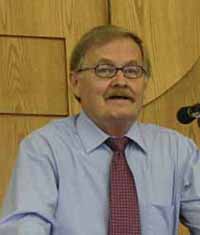Canadian Mennonite
Volume 12, No. 15
July 28, 2008
Church is central to Harry Huebner’s theology and life
Long-time professor lauded by colleagues and former students on his retirement from Canadian Mennonite University
Winnipeg
 |
“Judge a man by his questions, rather than his answers,” said the French writer, essayist and philosopher, Voltaire.
By that yardstick, Harry Huebner—who retired from full-time work after 37 years as a professor of theology and philosophy at Canadian Mennonite University (CMU)—can be judged to have lived, taught and served the church well. At a May 24 symposium celebrating his contributions to the university and the church at large, speakers noted Huebner’s willingness to ask difficult and challenging questions in an effort to prod Christians into thinking about, and living out, their faith.
CMU president Gerald Gerbrandt opened the event by noting that Huebner’s approach to faith, church and life was an “integrated approach that escapes easy categorizing,” combining theology, philosophy, peace studies and ethics. Through it all, one thing was clear for Huebner, he stated: “the church was central” in his theology “and in his life.” At the same time, he added that Huebner believed in “challenging the church. . . . The church is not the norm nor absolute, but the body of Christ, and as such embodies and echoes ‘Word made flesh.’?”
CMU alumnus Joe Wiebe, now a doctoral student at McMaster University, Hamilton, Ont., noted that his former professor punctuates the claims he makes “with a question mark” that elicits responses from others. “His genius is not to offer the last word,” he said, adding that Huebner is also “open to the possibility that he may be wrong.” At the same time, he said that Huebner cautions the church not to “take a victorious approach to theology,” but to be open to “questioning its own certainties.”
Cheryl Pauls, assistant professor of piano and music theory at CMU, shared how Huebner encouraged her to be sensitive and to listen to what people around her are saying—or singing. “Many bemoan a dearth of good singing today,” she said. “But rather than try to figure out how to fix it, we should try to adapt to it. . . . It is an expression of a confused cultural tongue. We need to heed its call, not lament its tone.”
Huebner’s son Chris, an associate professor of theology and philosophy at CMU, reflected on his father’s career in Christian higher education, suggesting that the idea of a Christian university itself might need to be scrutinized and questioned more deliberately.
Noting that Christian universities often tell potential students that they are safe and secure places to study, the younger Huebner wondered if they shouldn’t say the opposite—that a school like CMU might be “quite unsettling and painful for students.” If CMU was honest, he went on to say, it might tell students that it would “shake them, stretch them,” and cause them to feel “despair and hopelessness.” But those are good things, he said, because they can lead to “conversion, rebirth and regeneration.”
Jane Barter-Moulaison, assistant professor of theology at the University of Winnipeg, noted that Huebner not only asks challenging questions, but also “challenges the very questions we pose.” This, she added, was not the same as saying people should question everything, but rather, “If our questions are certainties and comfortable, they will not lead us to the truth.”
Travis Kroeker, a CMU graduate who now is a professor of religion at McMaster University, praised Huebner’s idea that “the church does not point to itself, but to the passage of God in the world.” He added that the New Testament itself questions traditional notions of success, opening with “a strange wild man in the wilderness,” someone with no schooling, no sophisticated organization, no credentials—someone who lived “on the edges and the margins, away from the conventional markers of success.”
Questions about who is the “brightest and best” do not concern John or Jesus, Kroeker said, suggesting that the “heart of the good news” is that it is “not concerned about human reputation.” This, he said, gave Jesus and John “an unsettling sense of power.”
In response, Huebner, a member of Charleswood Mennonite Church in Winnipeg, noted that his goal was to “not only give Christian answers to questions,” but to “make the questions Christian.” At the same time, he said he wanted to “see what we might say if we take seriously our commitment to Jesus Christ,” and also to help Christians find ways to “live faithfully in what can be a cruel, broken and heartless world.”
One answer that Huebner is sure of, he said, is that the cross and resurrection of Jesus are “God’s answer to human hopelessness.”